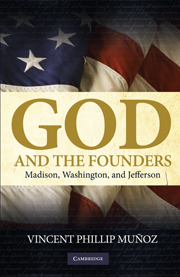Book contents
- Frontmatter
- Contents
- Acknowledgments
- Introduction: The Founders, Religious Freedom, and the First Amendment's Religion Clauses
- PART I THE FOUNDERS' CHURCH-STATE POLITICAL PHILOSOPHIES
- 1 James Madison's Principle of State Noncognizance of Religion
- 2 George Washington on Church and State: Religion and the Civic Good
- 3 Thomas Jefferson's Natural Rights Philosophy and Anticlerical Politics of Religious Liberty
- PART II THE FOUNDERS AND FIRST AMENDMENT RELIGION CLAUSES
- Conclusion: The Founders and Church-State Jurisprudence
- Appendix A “Memorial and Remonstrance against Religious Assessments” by James Madison, 1785
- Appendix B A Bill “Establishing a Provision for Teachers of the Christian Religion” by Patrick Henry, 1784
- Appendix C A Bill for Establishing Religious Freedom in Virginia by Thomas Jefferson, 1777
- Index
3 - Thomas Jefferson's Natural Rights Philosophy and Anticlerical Politics of Religious Liberty
Published online by Cambridge University Press: 05 June 2012
- Frontmatter
- Contents
- Acknowledgments
- Introduction: The Founders, Religious Freedom, and the First Amendment's Religion Clauses
- PART I THE FOUNDERS' CHURCH-STATE POLITICAL PHILOSOPHIES
- 1 James Madison's Principle of State Noncognizance of Religion
- 2 George Washington on Church and State: Religion and the Civic Good
- 3 Thomas Jefferson's Natural Rights Philosophy and Anticlerical Politics of Religious Liberty
- PART II THE FOUNDERS AND FIRST AMENDMENT RELIGION CLAUSES
- Conclusion: The Founders and Church-State Jurisprudence
- Appendix A “Memorial and Remonstrance against Religious Assessments” by James Madison, 1785
- Appendix B A Bill “Establishing a Provision for Teachers of the Christian Religion” by Patrick Henry, 1784
- Appendix C A Bill for Establishing Religious Freedom in Virginia by Thomas Jefferson, 1777
- Index
Summary
History, I believe furnishes no example of a priest-ridden people maintaining a free civil government.
Thomas Jefferson to Alexander von Humboldt, December 6, 1813Truth advances, and error recedes step by step only; and to do our fellow man the most good in our power, we must lead them where we can, follow where we cannot, and still go with them, watching always the favorable moment for helping them to another step.
Thomas Jefferson to Thomas Cooper, October 7, 1814James Madison may be “the Father of the Constitution” and George Washington “the Father of our Country,” but Thomas Jefferson is the Founding Father most often identified with America's commitment to religious freedom. When the Supreme Court issued its first significant interpretation of the Free Exercise Clause in Reynolds v. United States (1878) and its first significant interpretation of the Establishment Clause in Everson v. Board of Education (1947), it turned to Jefferson. This is not to say that Jefferson's views have been universally accepted or even commonly understood. Scholars who study him and judges who invoke him disagree about how Jefferson sought to separate church from state. That we disagree about Jefferson today should not be surprising. Even in his own lifetime, his ideas about religion and religious freedom were controversial and sharply contested. In his autobiography, Jefferson described the early battles to disestablish the Anglican Church in revolutionary Virginia as “the severest contests” in which he had ever been engaged.
- Type
- Chapter
- Information
- God and the FoundersMadison, Washington, and Jefferson, pp. 70 - 116Publisher: Cambridge University PressPrint publication year: 2009

